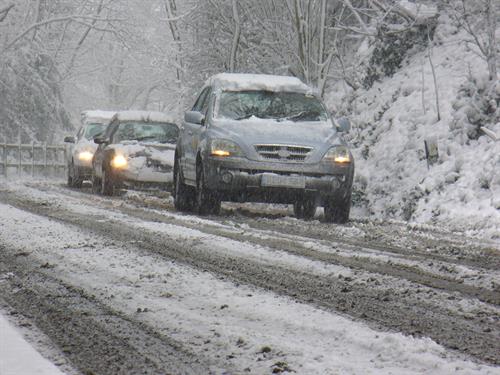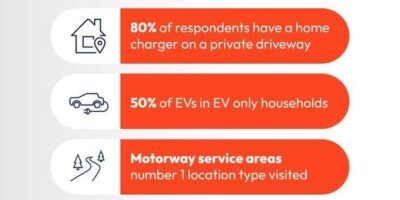Drivers are collectively planning in the region of 13m separate trips by car to see family and friends during the coronavirus ‘travel window’ between 23 and 27 December, although a fifth (22%) don’t expect to make any such journeys this year because of the virus, research by RAC Breakdown suggests.*
With two weeks to go until Christmas, the greatest number of individual trips – some 3.1m – look likely to take place on the first day travel restrictions are eased in England, Scotland and Wales (Wednesday 23 December). Christmas Eve and Christmas Day are predicted to see 2.8m and 2.5m trips respectively, around the same number as are traditionally planned for these days based on an analysis of RAC data over the last five years. A further 2.1m expect to travel between 23 and 27 December but aren’t sure on which days yet.
The research, which was conducted after the UK Government announced that family and friends would be allowed to meet up in person over a limited number of days by forming a three-household bubble, shows how just how pronounced the effect of the pandemic might be on travel habits this Christmas with nearly three-in-10 (28%) fewer drivers saying they are planning to use major roads to visit friends or family this year compared to last. In total, more than half (57%) aren’t planning on visiting friends or family by car at all, of which 22% cite concerns about coronavirus, with the remainder (35%) saying it is for other reasons.
The ‘coronavirus effect’ is most evident after Christmas Day when traffic is expected to tail off drastically – with drivers only planning an estimated 1.6m trips on Boxing Day, which is in stark contrast to previous years when there are usually 4.5m journeys. On Sunday 27 December just 933,000 trips are planned.
Add in the lighter traffic volumes this year as a result of continued home-working by many people, and the effect is likely to be fewer queues on the roads compared to previous years – although a single breakdown or collision always has the potential to change that.
Separate RAC research suggests drivers favour local trips this year, indicating problems with congestion may be more concentrated on smaller, town and city roads rather than major motorways.** Nearly six-in-10 (57%) expect their longest return trip to be no more than 50 miles in length, with a quarter (25%) saying it will be up to just 10 miles. Just over a quarter (27%) say their longest journey by car will be in excess of 100 miles.
Of drivers who will be using their cars for other purposes over Christmas, doing local grocery shopping is the top reason (82% of these drivers), followed by driving to go for a walk or get some exercise with people from the same household (41%). Just one-in-five of these drivers (18%) plan on using a car to visit a town or city centre for last-minute Christmas shopping, with a slightly smaller proportion (15%) doing the same thing at an out-of-town retail centre.
RAC Breakdown spokesman Rod Dennis said:
“The pandemic looks set to have a profound effect on drivers’ plans to see family and friends at Christmas time this year. Despite the loosening of restrictions to allow people to meet up as part of ‘festive bubbles’, our figures suggest many drivers aren’t keen – with a fifth saying the coronavirus is the reason why they’re not travelling.
“That’s not to say the roads will be empty over Christmas. Our research indicates millions of leisure journeys on major motorways and A-roads will still be taken, with 23 December being the focus of what will be a much less pronounced Christmas ‘getaway’ than we’ve grown to expect. An estimated 5.3m trips to see family and friends will take place on Christmas Eve and Christmas Day combined, roughly in line with other years – and we expect many of these to be more local journeys.
“It’s also the case that just a single breakdown or road collision can cause traffic to quickly snarl up and cause delays. This could especially be the case with drivers opting for more local journeys this year rather than the familiar criss-crossing of the country that tends to happen at Christmas time. Everyone can do their bit to reduce the chances of breaking down by checking over their car before they set out. Checking the tread, condition and pressure of tyres, together with oil, coolant and screenwash levels, make the chances of an unwelcome breakdown much less likely. This is even more important in a year when vehicles have been used less regularly. Drivers should also ensure they plan their journeys before they set out.
“The car will also come into its own for other sorts of festive trips – with Christmas grocery shopping the number-one reason, whether that’s shoppers going to browse and buy or take advantage of the rise in click-and-collect services. Problems in booking grocery delivery slots as a result of high demand this year might also have the effect of forcing more people to visit supermarkets by car.
“Whether drivers are using their cars for longer journeys this Christmas, or staying much more local, our teams will be working as hard as ever to keep people moving and give them peace of mind at the end of what has been a challenging and unprecedented year.”
For tips and advice on travelling over Christmas, check out the RAC’s Christmas getaway guide.
*Article Source www.rac.co.uk








